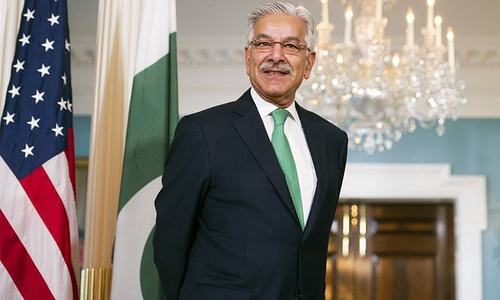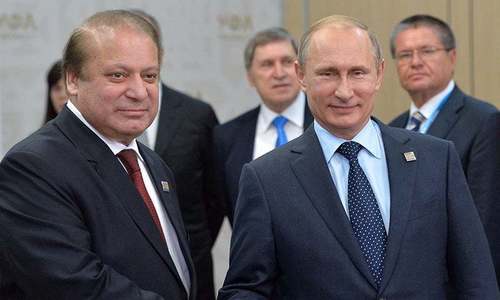Despite multiple reports in international media to the contrary, Pakistan has, at least for now, not been included in a list of countries with 'strategic deficiencies' in countering money laundering and combating financing for terrorism.
The decision was to be made in a three-day plenary meeting by the Financial Action Task Force (FATF), a global watchdog on money laundering and terrorism financing.
The meeting concluded Friday, February 23, without any explicit measures announced against Pakistan with respect to terrorism financing.
The countries on the FATF's watchlist, announced after the meeting, included Ethiopia, Iraq, Serbia, Sri Lanka, Syria, Trinidad and Tobago, Tunisia, Vanuatu and Yemen.
Pakistan's name was also absent from a public statement issued by the regulator following the meeting. Similarly, Pakistan was not mentioned in a statement mentioning the outcomes of the FATF's plenary meeting.
Soon after the watchdog's statements were issued, Geo News quoted Alexandra Wijmenga-Daniel, manager communications for the FATF, as confirming that Pakistan was not added to the so-called grey-list and that the FATF was not responsible for any reports making claims to the contrary.
Foreign Minister Khawaja Asif had said on Tuesday that Pakistan had been given a three-month reprieve by the global watchdog.
Asif had tweeted that Pakistan’s “efforts have paid (off)” and suggested that there had been “no consensus for nominating Pakistan”.
However, he had also suggested that the meeting had proposed a “three months pause” and asked for the Asia Pacific Group, which is part of the FATF, to consider “another report in June”.
That statement was contradicted earlier today in Indian and international media, which circulated reports that a decision had been made to include Pakistan in the FATF's grey list late Thursday night after Saudi Arabia and China allegedly withdrew their support.
Similar claims were also reported by Reuters, a London-based news agency. Reuters had cited an unnamed, "non-Indian diplomatic source" from one of the FATF countries as saying that the group had decided that Pakistan would be put back on the watchlist.
The reports had triggered a sharp drop in the Pakistan Stock Exchange's benchmark KSE-100 index, which plummeted as much as 615 points in intra-day trading immediately after activities resumed following a mid-day break.
The rout was somewhat contained, however, with the market closing with more modest losses of 261 points (0.6pc).
Critical review
The FATF session was being held to review proposals that included, among other things, putting Pakistan back on a list of countries which have failed to prevent terrorist financing.
The United States (US) and Britain had put forward a motion to place Pakistan on the FATF terrorist-financing watch list.
If adopted, the resolution would have placed Pakistan on the FATF grey-list of “jurisdictions with deficient anti-money laundering regimes”.
Pakistan was previously on the FATF watchlist from 2012 to 2015.
Interior Minister Ahsan Iqbal had tweeted today cautioning against speculation on the matter until there was official confirmation of the FATF decision.
Foreign Office (FO) Spokesperson Dr Muhammad Faisal, in a weekly press briefing in Islamabad today, said Pakistan had serious concerns over the motion moved by the US and United Kingdom at the FATF, Radio Pakistan reported.
Dr Faisal claimed that most US concerns over deficiencies in steps taken to curb money laundering and terror financing had already been addressed in 2015, when Pakistan exited the grey-list.
The FO spokesperson had added that Pakistan's name being taken off the grey-list was acknowledgement of the country's "robust mechanism" against money-laundering and terror financing, which he claimed was in line with international standards.
Prior to the FATF's official decision, Foreign Minister Khawaja Asif had taken to Twitter on Wednesday to announce that Pakistan had been given a three-month reprieve.
“Grateful to friends who helped,” Asif had added.
Read: Pakistan deserves international support, not a place on the FATF grey-list
On the same day as Asif's tweet, The Wall Street Journal had named China, Turkey and Saudi Arabia as the 'friends' who had come forward to rescue Pakistan, saying that the three countries had blocked the US's motion to put Pakistan on the list.
Terming it a rare disagreement between Riyadh and the Trump administration, the WSJ, citing officials involved in the process, had reported that Saudi Arabia joined Turkey and China in a move to block the US-led attempt.
According to the report, the Trump administration had been trying to reverse the reprieve to Islamabad and was pressuring the Kingdom of Saudi Arabia (KSA) and other countries to withdraw their support to Pakistan.
Scramble for adequacy
In the lead-up to the FATF plenary session this week, the government had taken control of three dispensaries run by Hafiz Saeed's Jamaatud Dawa (JuD) and the Falah-i-Insaniyat Foundation (FIF) in a rural area near the capital.
Additionally, President Mamnoon Hussain on Feb 9 had quietly promulgated an ordinance amending the Anti-Terrorism Act, 1997 with regards to proscription of terrorist individuals and organisations to include entities listed by the United Nations Security Council (UNSC) — in a move that would end a longstanding ambiguity over the status of the JuD and FIF by firmly placing them on the list of proscribed groups.
Read more: Anti-terror law amended to ban UN-listed groups, individuals
Nonetheless, on Thursday, ahead of the FATF's outcomes, White House deputy press secretary, Raj Shah, hadbexpressed the Trump administration's displeasure over the efforts so far made by Pakistan. He told reporters that US President Donald Trump is not "satisfied with progress when it comes to Pakistan".
"For the first time, we’re holding Pakistan accountable for its actions. We’ve seen modest progress in terms of Pakistan’s actual acknowledgement of these concerns, but President [Trump] is not satisfied with progress when it comes to Pakistan," Shah had said while answering a question at the press briefing about the US's South Asia policy.
The FATF, an intergovernmental body based in Paris that sets global standards for fighting illicit finance, had previously warned Islamabad it could be put back on the list without further efforts to crack down on the flow of funds to militants.
Pakistani officials and Western diplomats had said being put on the FATF watchlist could deal a blow to Pakistan’s economy, making it harder for foreign investors and companies to do business in the country.













































